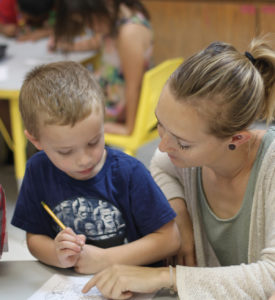 Geometry captivated an audience at Self Development Preschool.
Geometry captivated an audience at Self Development Preschool.
All eyes were on the instructor, and there was a hushed tone, respectful, the kind of air you’d find in a serious honors high school math class. There were two key differences however. First, it was only a basic geometry class, and second, it was in a preschool.
The teacher asked, “What is the difference between a square and a rhombus?”
Megan, a precocious youngster, answered, “A square has four equal corners and four equal sides. A rhombus only has four equal sides.”
The story is impressive, heartwarming, and thanks to a new study from University of California, Berkeley, also confirms that introducing children to advanced concepts early yields higher performing students later. This study fits a nice narrative of a stronger learning program—rigorous and advanced, integrated and playful. These three features make for extremely high performing students in later grades.
Rigorous and Advanced
The Berkeley study found children who attend these preschools outperform peers who attended less rigorous preschools on both literacy and math. In fact, children who entered a preschool by 2.5 years of age and remain through age 4 showed stronger cognitive gains. This seems to echo a longitudinal study in Britain, showing distinct benefits from higher quality preschools.
Integrated
Additionally, the integration of the subjects seems key. Enter STEM programs. STEM stands for Science, Technology, Engineering and Mathematics. The curriculum is an integrated approach to teaching a series of concepts, seeing learning and subject area as interconnected rather than discrete and isolated.
Although STEM is now a common program found throughout the nation, and its veracity and efficacy has been tested ad nauseum, Self Development Preschool actually has been using a STEM curriculum since the late 1980s, well before its popularity. The preschool integrates discrete sciences and builds upon the concepts and knowledge through the year and across age groups. The curriculum is both vertically and horizontally aligned.
Playful
Learning seems to be easiest when educators have the benefit of an academic Trojan Horse, a mechanism to sneak in the tougher concepts through a gift, like play. Bruce Fuller, the lead author of the University California-Berkeley study, stated, “Simply dressing up like a firefighter or building an exquisite Lego edifice may not be enough. If you can combine creative play with rich language, formal conversations and math concepts, that’s more likely to yield the cognitive gains we observed.”
A child’s natural inclination to play is, in fact, just the natural inclination for scientific inquiry. For the past 20 or so years, play often is used as a way of carrying out mini experiments, reaching new experiences, and revising initial hypotheses based off the results of the experiments.
To this end, Self Development Preschool often unites STEM learning with play activities. Recently, a graduate of Self Development Academy developed and taught a summer camp on physics. He taught aerodynamics through the use of a generations old inexpensive toy—the paper airplane. Through concepts, such as wind resistance and drag, the tiny scholars learned how to design the perfect paper airplane.
School Readiness
These results also seem to confirm that STEM and vigorously designed preschools have extraordinary impacts on school readiness, the degree to which students are prepared for kindergarten from the moment they matriculate.
Early childhood education programs similar to the ones offered at Self Development Preschool are examples of this research. Self Development Preschool serves as a feeder school to Self Development Academy, a top ranking school in the nation, whose grade levels usually are one to two years ahead. The administration found that students who attend Self Development Preschool first have a vastly greater likelihood of success in their studies than students who have not attended the preschool.
Early childhood education is extremely important in ensuring that children meet cognitive milestones. Programs like those at Self Development Preschool help children not only meet these milestones, but also enable them to excel at challenging and top ranking kindergarten through grade eight schools. These programs help children become the next creative architects, like I.M. Pei or Frank Gehry.
Dr. Anjum Majeed, founder of Self Development Preschool and superintendent of Self Development Academy, likes to quote Albert Einstein to illustrate this last point. “To raise new questions, new possibilities, to regard old problems from a new angle requires creative imagination and marks real advance in science.”
For more information, please call Self Development Preschool at (480) 772-3721.

